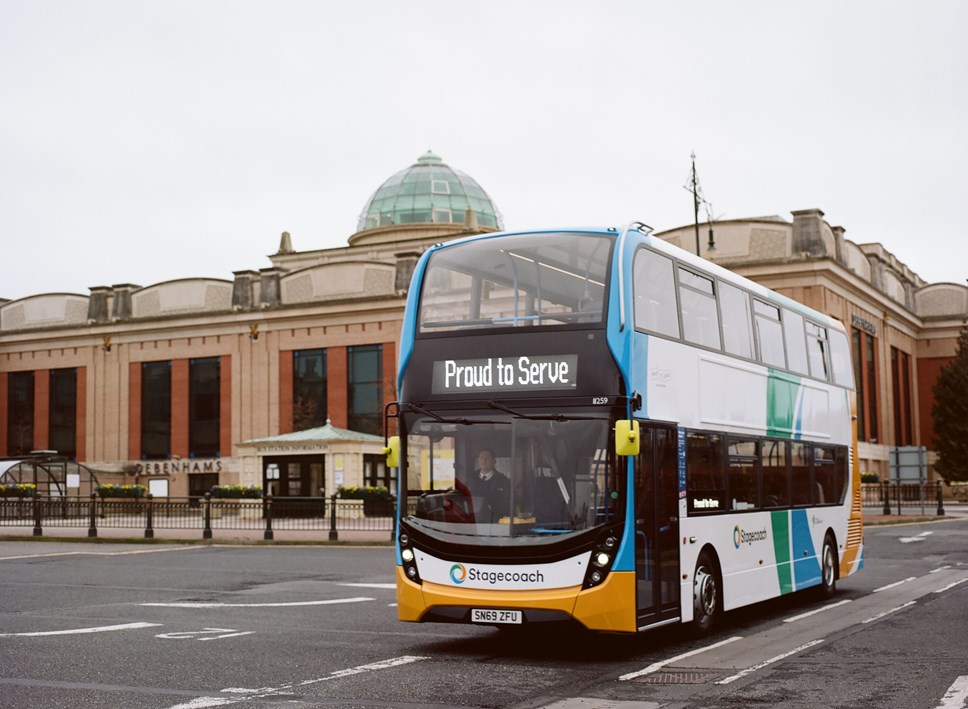
Stagecoach calls for joint strategy with government to secure vital public transport networks out of Covid-19 lockdown and beyond
- Britain's biggest bus and coach operator sets out bold six-point plan for "new normal"
- Urgent operational and investment plan needed for short-term transition
- Radical long-term changes can help reboot regional economies and protect communities
- Covid-19 tragedy should be a "defining moment" that transforms society for better
Britain's biggest bus and coach operator today (6 May 2020) called for a joint strategy between industry and government to secure vital public transport networks out of the Covid-19 lockdown and beyond.
As the UK Government plans to outline its thinking on how the country will be eased out of lockdown, Stagecoach set out a six-point plan for the "new normal" identifying the short and long-term changes that will help reboot the economy and protect communities.
Chief Executive Martin Griffiths outlined the proposals in a social media blog and said sustainable public transport was critical to the future. He called for the tragedy of Covid-19 to be a "defining moment" that leads to a transformed society and creates a legacy that honours key workers who have given their lives in the fight against the pandemic.
The call comes as recent research by consultants SYSTRA suggests public transport use in Britain's cities could be 20% lower than pre-Covid-19 levels after lockdown.
The six-point plan calls for:
- a joint operational and investment plan developed by industry and government to ensure a sustainable transition of Britain’s bus networks from the emergency levels of lockdown to more comprehensive links which support the country’s recovery. Measures needed include steps to rebuild confidence in mass transit, a move away from peak-time commuting to spread demand, and investment in transitional support for transport operators as passenger numbers take time to grow.
- radical, permanent changes by national and local government to infrastructure and planning. Road and street space should be prioritised for walking, cycling and high capacity public transport over private cars, with a fundamental reallocation of limited space and steps to encourage first and last mile connections. Public mobility hubs rather than private car parking spaces should be requirements for planning new housing developments, offering public transport connectivity, electric charging points and cycling.
- wide-ranging measures to deliver on the government's levelling up agenda for regions outside London, with many hit hard by the economic shock of Covid-19. This includes new place strategies for towns and cities to rethink high streets, promote local spending and create new attractions, as well as leveraging public transport's capacity to bring shoppers and visitors to regions on a scale that will not damage the environment.
- lifestyle changes, particularly around travel, as well as a focus on technology to address the damaging impact of transport emissions. Pollution, already responsible for asthma and lung disease, is now being linked as a contributor to Covid-19 deaths. Many single-user car trips - the transport equivalent of disposable plastic bags - should be replaced by public transport in urban locations.
- a "grown-up conversation" to re-examine fiscal policy as the government considers how to pay for the coronavirus pandemic and the necessary actions the country has taken. This would include a complete transformation in how transport journeys are taxed. A move to a system where the polluter pays and sustainable behaviours and use of buses, trams and trains, as well as active travel, are rewarded to make these modes more affordable and accessible to all.
- targeted investment in decarbonisation, including sustainable transport and infrastructure, to help restart the economy, put Britain at the forefront of the green revolution and speed up recovery. Maximising the potential of Britain's world class and world-leading bus manufacturing sector by accelerating government investment in electric bus fleets will deliver a cleaner environment, improved health and cement Britain's position as a clean-tech leader.
Martin Griffiths said: "Covid-19 has taken a terrible toll on many people's lives across the UK and overseas. But among all the human tragedy, the pandemic has given us a window on what could be a positive future world - one with dramatically fewer cars on our roads, safer streets, cleaner air and less damage to our environment.
"As government examines how to take Britain out of lockdown, we must make Covid-19 a defining moment to deliver fundamental changes in how we manage mobility and put sustainability at the heart of decision-making. Public transport - particularly our regional bus networks - and active travel must be central to a transformed approach by all governments.
"The lockdown has shown how much the country is missing human contact. Buses provide that essential daily social link, helping combat loneliness and hidden mental health challenges. While some have switched to home working during Covid-19, for many that is not possible. Buses are delivering vital emergency links for key workers and they are as critical to our economy in normal times, linking everything from retail centres to manufacturing facilities. Leisure too is a shared experience that depends on extensive public transport connections.
"There is no reason why we all cannot return to safely using Britain's most important public transport mode. Transitional support is an investment that will pay back many times over in helping our citizens, communities, economies and planet recover."
Mr Griffiths added: "Major events can lead to major change. The 9/11 attacks signalled a new approach to security and global co-operation against terrorism. We need to make Covid-19 the game-changer for sustainable transport and out of tragedy create hope. By grasping this opportunity and working together, we can create a real legacy to honour the key workers that have selflessly given their lives in the fight against coronavirus."
A copy of the full blog is available here: https://www.stagecoachgroup.com/media/insight-features/creating-a-legacy-to-honour-those-who-have-given-their-lives-to-fighting-covid-19.aspx
ENDS
